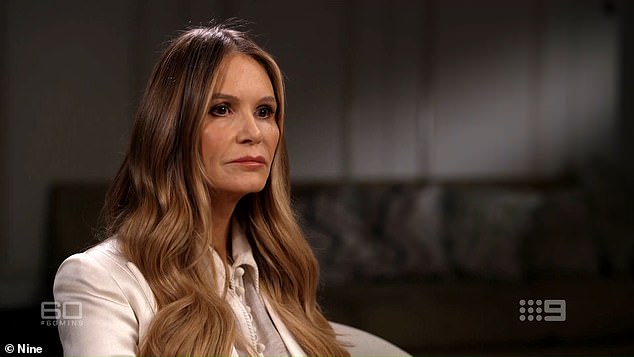Elle Macpherson has addressed her breast cancer battle in a candid interview with 60 Minutes Australia on Sunday.
The Australian model was diagnosed with breast cancer seven years ago but revealed the diagnosis for the first time in an interview on Monday,before expanding on her journey and the hard decisions she made during the 60 Minutes chat.
The 60-year-old told host Tracy Grimshaw that she was in 'shock' when she got the diagnosis,but chose not to have the mastectomy and chemotherapy that her doctors suggested.
'As you can imagine,it was a bit of a shock. I think any woman,most women,when they're diagnosed,don't think it will to happen to them' she said.
Elle underwent a lumpectomy,and learned that cancer had no clear margins - meaning it could have spread.
She said she was told to have a 'mastectomy,chemotherapy,radiation and hormone replacement'.
'I sit here cool as a cucumber talking about it but the reality is,you know,it was a very big deep breath moment - let's put it that way' she said.
'You know,it's not logical. It was just an inner sense. I had a feeling that there was a different way to approach this and I followed it.'

How is breast cancer treated?
Treatment options which may be considered include surgery,radiotherapy and hormone treatment. Often a combination of two or more of these treatments are used.
Surgery: Breast-conserving surgery or the removal of the affected breast depending on the size of the tumour.Radiotherapy: A treatment which uses high energy beams of radiation focused on cancerous tissue. This kills cancer cells,or stops them from multiplying. It is mainly used in addition to surgery.Chemotherapy: A treatment of cancer by using anti-cancer drugs which kill cancer cells,or stop them from multiplying.Hormone treatments: Some types of breast cancer are affected by the 'female' hormone oestrogen,which can stimulate the cancer cells to divide and multiply. Treatments which reduce the level of these hormones,or prevent them from working,are commonly used in people with breast cancer.How successful is treatment?
The outlook is best in those who are diagnosed when the cancer is still small,and has not spread. Surgical removal of a tumour in an early stage may then give a good chance of cure.
The routine mammography offered to women between the ages of 50 and 71 means more breast cancers are being diagnosed and treated at an early stage.
For more information visit breastcancernow.org or call its free helpline on 0808 800 6000
60 Minutes AustraliaElle MacphersonArizona
© OfficialAffairs